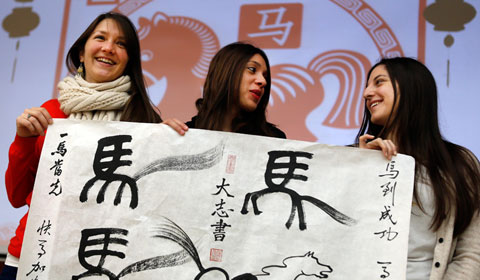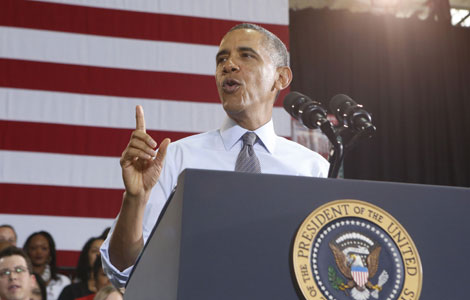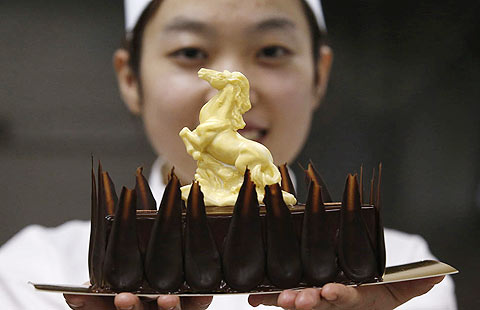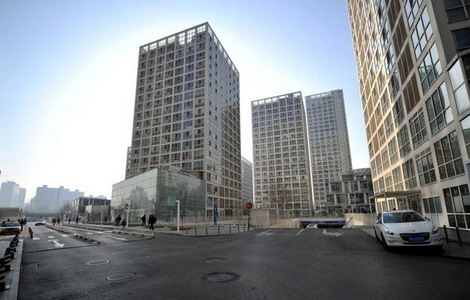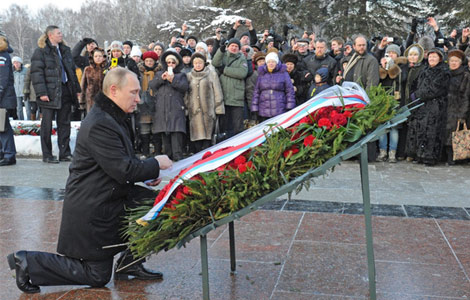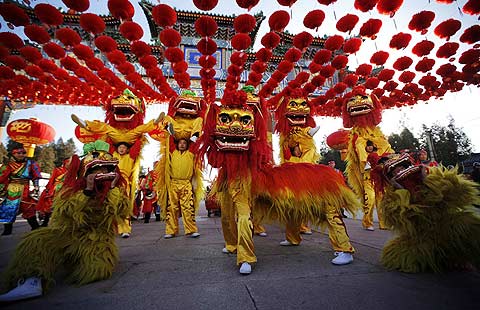If the shoe fits then wear it
Updated: 2014-01-31 15:25
By Andrew Moody and Wang Chao (China Daily USA)
|
||||||||
Ethiopia trying to become center for manufacturing in Africa on the back of Chinese investment, report Andrew Moody and Wang Chao
Modern and brightly lit with all the staff in neat uniforms, it could be a state-of-the-art manufacturing facility in Shenzhen or Guangzhou.
The Huajian shoemaking factory is not in China, however, but about 30 kilometers from the center of Addis Ababa.
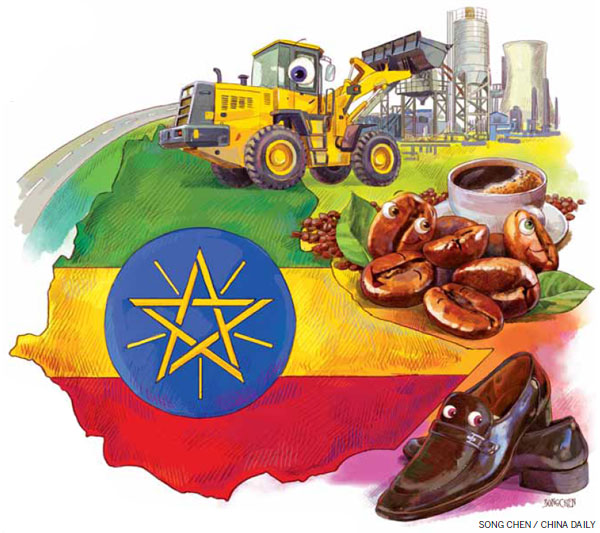
Even its location is something of a disguise. There is nothing much African about the Eastern Industry Zone in that in appearance it could be any one of thousands of industrial parks around China.
Huajian, which employs 3,000 local workers, however, could have a significance way beyond just being a single factory.
It could ultimately be the start of a chain of investments that revolutionizes the economy of Africa's most significant economy on the Horn of Africa.
Chinese investment is at the vanguard of the Ethiopian government's attempts to move away from being an agriculture-dependent economy to one in which manufacturing plays a more dominant role.
Agriculture now accounts for around 43 percent of GDP with manufacturing making up just 4 percent.
If this transformation is successful it could prove to be something of a role model for the rest of Africa, which is largely seen by major multinationals as a less desirable location for manufacturing investment than Bangladesh, India, Vietnam, Cambodia or even China itself.
This engagement with Ethiopia is also different to the stereotype of one centered around China buying up African resources.
Although the country does have potentially large reserves, including iron ore and gas, they have gone largely untapped so far.
If there was any doubt that manufacturing jobs were needed in Ethiopia, where youth unemployment of 50 percent is one of the highest in the world, this might have been removed by the fact that 4,000 turned up for 100 jobs when Huajian began recruiting in 2012.
So successful has the plant been that Huajian Group, which has China bases in Dongguan in Guangdong and Ganzhou in Jiangxi, is planning a $2.5 billion investment with the China-Africa Development Fund to create a huge footwear manufacturing base that will create 100,000 jobs within five years and export up to $4 billion of shoes every year.
Helen Hai, former vice-president and chief executive officer of Huajian's overseas investment operation, who helped set up the factory, says that what is not widely understood is that China, being the manufacturing workshop of the world for 20 years now, has a real comparative advantage in this area.
She says many in the West might view China's manufacturing as being in decline because of higher labor costs but in reality companies can now leverage their expertise in areas such as Africa.
"This advantage in manufacturing has already shifted from the West to China. The West doesn't really have it anymore with this type of operation. What we are doing is combining Chinese know-how with competitive labor," she says.
Hai, 35, also a former UK-based actuary with a management degree from INSEAD, actually ran the production line from the shopfloor when the operation first started and says that many Western firms lack this manufacturing competence.
The company makes shoes for leading brands such as Coach, Clarks and Guess.
Labor is just 2 percent of production costs compared with 22 percent in China, but logistics cost quadruple from 2 to 8 percent. "Logistics is the one big problem of doing anything in Africa," she says.
This lack of infrastructure is something the Chinese have also made a significant contribution to remedying over the past decade.
China Communications Construction Co, one of China's largest State-owned companies, has built many highways in Addis Ababa, including the $100 million ring road project, which was completed in 2004.
Another project is the $612 million, 80 km road between the capital and the city of Adama, which is set to be completed ahead of schedule.
It will also work on the recently announced $250 million expansion of Bole International Airport in Addis Ababa, giving it extra capacity and a new VIP terminal. This will be funded by a loan from China Exim Bank.
China's deepening relationship with Africa is also symbolized by the gleaming new African Union headquarters, which cost $124 million and was "gifted to the African people" by the Chinese government.
The growing relationship is that of trade between China and Ethiopia, which has risen more than 25 times over the past decade to $1.8 billion in 2012. It is forecast to rise to $3 billion by 2015.
Ethiopia's exports to China, including one of its principal exports - sesame seeds - make up just $300 million with Chinese exports to Ethiopia contributing $1.5 billion.
This growing trade was evidenced in December when more than 150 Chinese companies exhibited at the 2013 (Africa) China Commodities, Technology & Service Expo at the Millennium Hall in Addis Ababa, which was seen as a landmark event.
Wang Yi, China's foreign minister, said on a visit to Addis Ababa earlier this month that he would like to deepen the trade relationship, particularly with agricultural products and textiles.
"Many Chinese textile and agricultural products companies are looking to expand their businesses overseas, and Africa is their best destination. I hope Chinese companies can help Africa to accelerate its industrialization process," he said.
This accords with the Ethiopian government's plan to increase employment in its domestic textile industry tenfold to 500,000 within the next two years.
Qin Jian, deputy head of mission at the Chinese embassy in Addis Ababa, says China has advantages over Western countries when trading with Ethiopia, particularly in such areas as lower-cost machinery and heavy engineering.
Qin, who was speaking at the ambassador's residence in a leafy area of the city, believes that China has played a key role in Ethiopia's development.
"Chinese companies are really familiar to people here. They have played a large part in developing infrastructure, which Ethiopians see as ensuring their well-being and sustainable long-term development."
He believes the China-Ethiopia relationship gives the lie to accusations in the West that China only wants to grab Africa's resources and become a new colonial power.
"Nowadays the Western media tries to demonize China-Africa relations and only report the bad side such as supposed violations of natural resources. Ethiopia is a non-natural resource country but we have large-scale investment," he says.
Over at the sprawling campus of the University of Addis Ababa, one of Africa's leading academic institutions, Alemayehu Geda, a professor of economics, says there are a number of reasons why China sees Ethiopia as an important economic and political partner.
"It is a huge potential market for a start. It has a population of more than 80 million, making it the second most populous country in Africa.
"The country has always been politically active across the continent, even before the African Union was based in the city. If you have good relations with the Ethiopian leadership you can network the rest of the country."
Geda also says that Ethiopia is increasingly acting as a shop window for Chinese infrastructure expertise.
"Because of the African Union, there are a lot of political visitors. They can see things such as the electric rail that is being built and they might think to themselves that they would like one of those in their own country," he adds.
Fana Gabresenbet, a lecturer at the Institute for Peace and Security Studies, also at Addis Ababa University, says most Ethiopians connect with China through things that affect their lives.
"The average person relates to China in terms of clothing, kitchenware, cellphones and other consumer goods that China is exporting. With infrastructure, their evaluation might be positive in terms of getting the job done quickly," he says.
"I am not sure that China does too well with their soft power. The state media here reports about all the big infrastructure projects and meetings with ministers but the private media contains a lot of criticism, particularly in relation to roads that are supposed to last 20 years showing wear after a few years."
Gabresenbet, who was speaking over coffee in the lobby of the Intercontinental Hotel, one of the city's five-star hotels that contrast sharply with the poverty on the streets outside, dismisses the idea that China is acting as a colonial power in Ethiopia or Africa but he says it does have interests.
"We don't have oil and valuable natural resources so you can't blame China for these things in Ethiopia but I would say Ethiopia is an important country to have relations with since by extension you have the potential for influencing the political process in Sudan, where China has big natural resource interests."
For many Ethiopians what China can bring in terms of jobs is paramount. Eastern Steel, which makes spiral steel and other steel products, is one of the latest Chinese companies to set up operations in the country.
It began operations in October at an 8,500 square meter factory at the Eastern Industry Zone.
With a capacity of 300,000 tons a year, it will be Ethiopia's biggest steel company.
By December it had already hired 108 workers and had 50 Chinese staff on the ground training them. It will be supplying steel to, among others, Chinese construction companies around the city.
Miao Wenwei, the 42-year-old general manager, says there is a need for higher-grade steel in Ethiopia.
"The quality of the locally made steel is not good. It is like the quality in China in the 1980s," he says.
Apart from the market opportunity, lower labor costs make the margins more comfortable. "Labor is cheap. In China you have to pay workers between 160 yuan ($26) and 200 yuan a day. Here it is about 20 yuan per worker," he says.
The Eastern Industry Zone, where 11 factories are currently located, has been a magnet for a lot of Chinese investment. It is one of the largest industrial parks of its kind in Africa.
The park is a combined Chinese-Ethiopian government project but has been developed and operated by the private Jiangsu Qiyuan Group, based in Suzhou, Jiangsu province.
It is not just aimed at Chinese companies. Unilever NV, the Anglo-Dutch consumer goods giant, is set to open a 5,000 sq m shampoo factory in June. A Vietnamese textile company is also planning a base.
Lu Qixin, deputy director of the site, with his trademark big Versace dark glasses, is a familiar figure as he drives around the park.
He says the whole project has been a major commitment and the company has already invested $80 million in the site.
"It is draining on the finances. Currently, we are doing this with my brother's money. We are looking to get a subsidy this year from the Chinese Ministry of Commerce," he says.
Nonetheless, the company wants to further develop the site and now has planning permission for a five-star hotel and a residential and retail development complex adjacent to it. It should be completed by 2017.
"We will do the residential area first so when Chinese companies send people here there will be somewhere for them to stay," he adds.
Amid all this development the lives of many Ethiopians are being transformed.
Mula Warsa, 20, was one of Huajian's first employees and is now manager of the packing department, which involves supervising 20 people and earns 3,000 Ethiopian birr ($150) a month. She was hired straight from technical college where she studied footwear production.
Speaking after lunch at the impressive canteen at the factory, where workers eat either in the section serving Chinese food or the one with local dishes, says there is a good working relationship between the Chinese and Ethiopian staff. "There may be cultural differences but these do not affect how we work together," she says.
Contact the writers at andrewmoody@chinadaily.com.cn and wangchao@chinadaily.com.cn
Most Viewed
Editor's Picks

|

|

|

|

|

|
Today's Top News
Largest Chinese Internet IPO yet
US experts divided over China's local debts
Xi extends Lunar New Year greetings
Ambassador nominee vows to expand China ties
HK slaps sanctions on Manila
More Chinese set to travel overseas
Lenovo makes move on Motorola
China-themed malls a new trend in the Bay area
US Weekly

|

|
